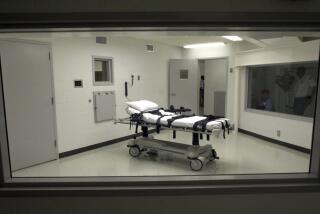Judge Won’t Dismiss Case Challenging Gas Chamber
- Share via
SAN FRANCISCO — In a case that caused a controversial 11th-hour delay in the execution of Robert Alton Harris, a federal judge refused Thursday to dismiss a challenge by Death Row inmates to the use of lethal gas to carry out the death penalty.
But the judge delayed further action until September to see whether the state Legislature passes a bill that would give condemned inmates a choice between gas and a lethal injection--a development that could make the case moot.
U.S. District Judge Marilyn Hall Patel granted the delay after a state prosecutor assured her there was virtually no possibility that another execution would take place by January, when the new law would take effect.
“There doesn’t appear to be any organized or serious objection to the legislation,” said state Deputy Atty. Gen. Dane R. Gillette. “There may never be another execution by gas at San Quentin.”
An attorney for the American Civil Liberties Union, Matthew A. Coles, argued that Patel should issue an order immediately to prohibit executions by gas--the only method authorized by law.
The judge declined to do so, instead setting a hearing on the ACLU’s request for a preliminary injunction for Sept. 23, allowing the Legislature three months to act on the issue.
But Patel also refused the state’s motion to dismiss the case on grounds that the validity of gas executions was legally resolved by the state Supreme Court when it rejected a last-minute challenge to the method by Harris’ attorneys. That state court proceeding, Patel said, may not have provided the “full and fair hearing” to which the issue was entitled.
The suit, a civil rights action, was brought by the ACLU on behalf of more than 300 inmates on Death Row. The inmates contend that lethal cyanide gas, which brings death by asphyxiation, causes lingering pain and agony and violates the constitutional ban on cruel and unusual punishment.
The challenge was filed only four days before the April 21 execution of Harris, causing a flurry of last-minute court activity that delayed Harris’ death for six hours and nearly caused postponement of the execution for what could have been months.
Patel issued a temporary stay blocking the execution pending proceedings on the suit, but was reversed quickly by a panel of the U.S. 9th Circuit Court of Appeals. Later, as Harris’ scheduled midnight execution was only hours away, other appeal court judges began filing a series of four stays to allow hearings on the gas suit and another last-ditch challenge by Harris. Finally, in the pre-dawn hours, the U.S. Supreme Court stepped in to overturn the stays and allow the execution to take place shortly after 6 a.m.
Meanwhile, state Sen. Quentin L. Kopp (I-San Francisco) and Assemblyman Tom McClintock (R-Thousand Oaks) have introduced legislation in Sacramento that would give inmates a choice between lethal gas and lethal injection.
The measures, pending before a Senate committee, would bring California in line with a nationwide trend toward injection as a method of execution. At present, California is only one of three states that provides for death by gas.
The legislation has drawn support from state Atty. Gen. Dan Lungren as a means of defeating current and future challenges to the methods used for executions. One provision of the measure backed by Lungren would ensure that if either gas or injection were ever struck down in the courts, the other would be used for executions.
“There is no nice way of taking someone’s life,” the attorney general said in announcing support of the measures. “This is a solemn job which creates emotional anguish for both the condemned and those held responsible for carrying out the execution.”
The ACLU remains neutral on the bills, choosing not to endorse any method for carrying out the death penalty. “We think all methods of capital punishment are inhumane,” said Margaret Pena, a legislative advocate for the group.
Another, potentially landmark issue in the case involves an unprecedented, court-ordered videotape of Harris’ execution, now being held under court seal.
The Radio-Television News Directors Assn. of Northern California recently made an informal request to Patel seeking access to the tape. According to association members, the judge deferred action on the request pending developments in the civil rights case.
State prosecutors have said they will resist any effort to make the tape public.
More to Read
Sign up for Essential California
The most important California stories and recommendations in your inbox every morning.
You may occasionally receive promotional content from the Los Angeles Times.









